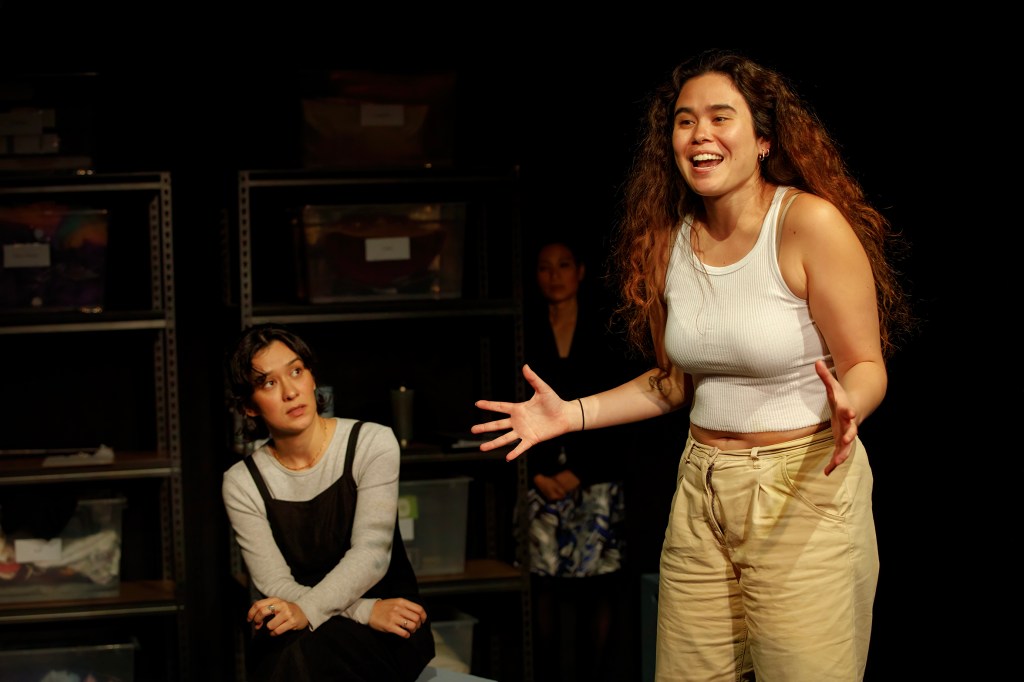(not that anyone would care, but I think) What makes theatre an extraordinary artform is that it can do two extraordinary things.
The first of those extraordinary things is that theatre embodies thoughts and feelings. Ideas that are rich, complex and subtle, and feelings that are intense, ephemeral and ineffable, are embodied by an actor: through their voice, through their movement, and through their spatial relationship with their material environment and the people who inhabit it. If theatre can be said to fairly represent reality, it does so because of this sense of the concrete. As in the mysterious miracle that is Life, certain things just are.
The second of the extraordinary things theatre does is that it allows different voices. Characters have their own distinct perspective. This doesn’t only facilitate conflict; it also manifests multiplicity. If theatre can be said to fairly represent reality, it does so because of this sense of the unresolved. As in the mysterious miracle that is Life, nothing is neat.
What makes Short Blanket by Matt Bostock a terrific piece of theatre is that it embraces both of theatre’s extraordinary attributes. (New Australian work, especially in the indie scene, is prone to attempt only the first of them.)
Short Blanket is one of the most exciting new shows I’ve seen for quite a while; it’s whip-smart, with a beating heart.

It’s the story of writing a play, or more specifically the story of development hell. (I suspect writers only endure the development process – The I-don’t-think-my-character-would-say-that sort of torment – because at some time something like it will have to be lived through if the two special attributes of theatre are to be achieved.)
In Short Blanket, Lainey’s play is being workshopped. She wants to represent the challenges Asian Australians experience, or perhaps more broadly, the pain of the global majority in a world yet to fully divest itself of colonialism. But not everyone wants it presented her way. Actor Dominique wants it angrier. Actor Joey wants it more forgiving. Company artistic director Gloria wants it more saleable. I’m simplifying (as the mono-voice of a review will do) but I’m hoping to capture Short Blanket’s sense that not everything is obvious or inarguable (despite certainty being a rather fashionable fallacy at the moment.) A play that uses the dramatic form so well is fully conscious that not every aspect of reality can be easily represented in that dramatic form. As Gloria says to Lainey, (I paraphrase) You don’t have a story, you have a feeling.
How do you represent injustice in an artform that requires an audience to sit through it and to pay for the privilege? Why use the dramatic form for this purpose at all? Every tool is not for every job. (A personal digression: it is odd that we modern theatre makers see ourselves as a sort of priestly class, responsible for the ethical education of others.) The script is very aware of the tricky question of what value we are to put on theatre. One character suggests, that if your audience is predominantly white, it won’t matter if your show is crap, because they’ll still say it was a privilege to have seen it.
Tiffany Wong’s cast do wonderful work. Andrea Magpulong’s Lainey captures the tension between the desire to make a show happen and the desperate need to bear witness. Dominique Purdue brilliantly presents the actor’s journey from initial excitement to bitter disillusionment as her hopes for the project flounder. Joseph Tanti as Joey embodies both the brutal arrogance of the privileged characters he performs in the workshopped play and the difficulties of telling a story that isn’t his. Monica Russell as the artistic director of the company effectively marries both the cold rationality required for financial realities and the resentment of a pioneer who feels her long efforts are being ignored. Sayuri Narroway as the director of the workshop presents a calmness that cleverly hides a different agenda.
Wong uses the intimate Meraki space marvellously, effectively presenting both the world in which the artist characters perform and the world in which these artists reflect on that performance.
The last image of Short Blanket is especially powerful. The spoiler rule means I shouldn’t really describe it. But I can say it functions gloriously as both an indictment of injustice, and as an invitation to ponder from where our motivation for theatre-making should come.
Paul Gilchrist
Short Blanket by Matt Bostock
presented by Slanted Theatre
at Meraki Arts Bar until 3 June
One Response to “Short Blanket”